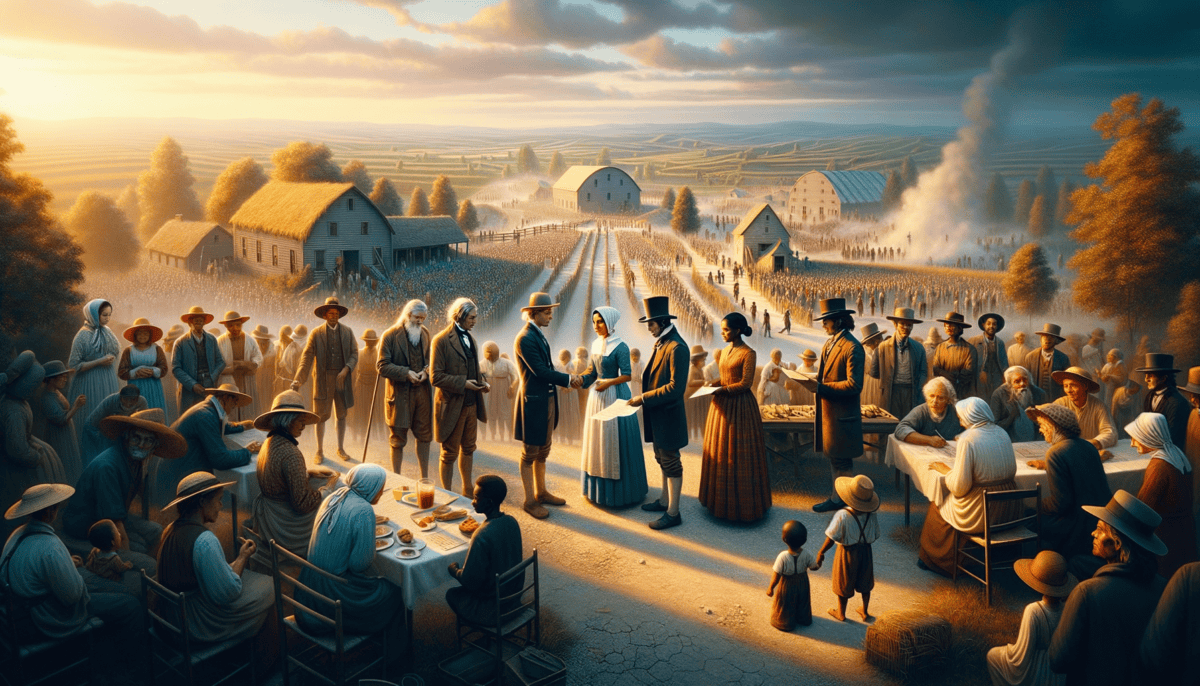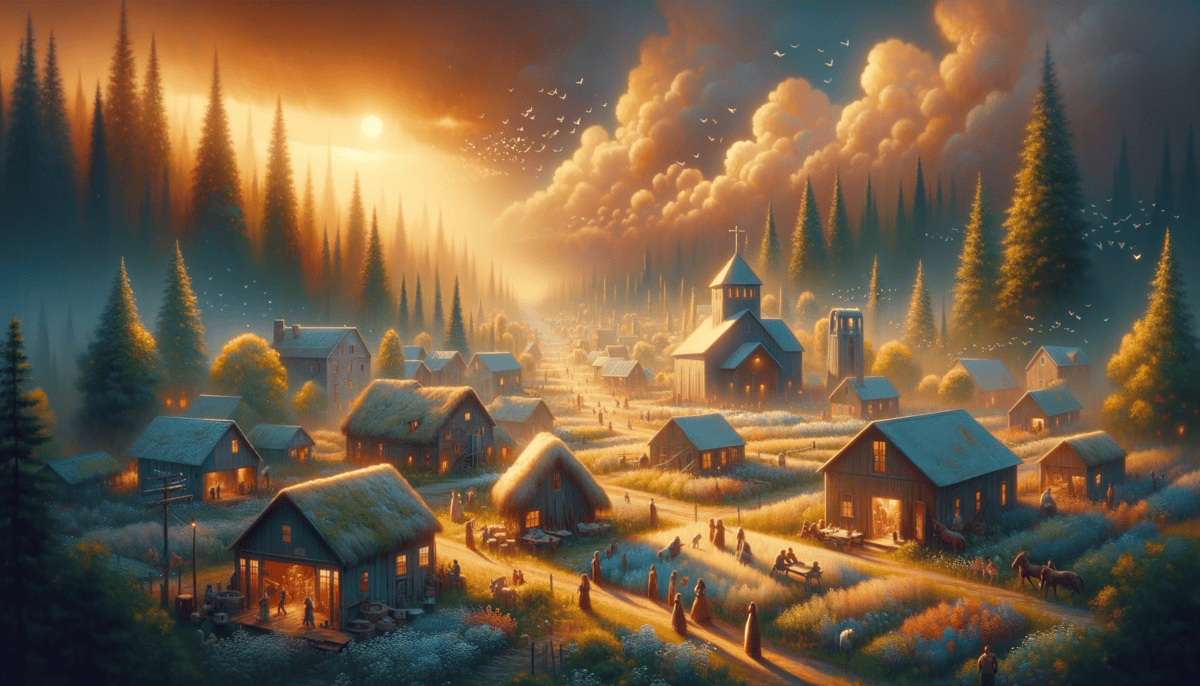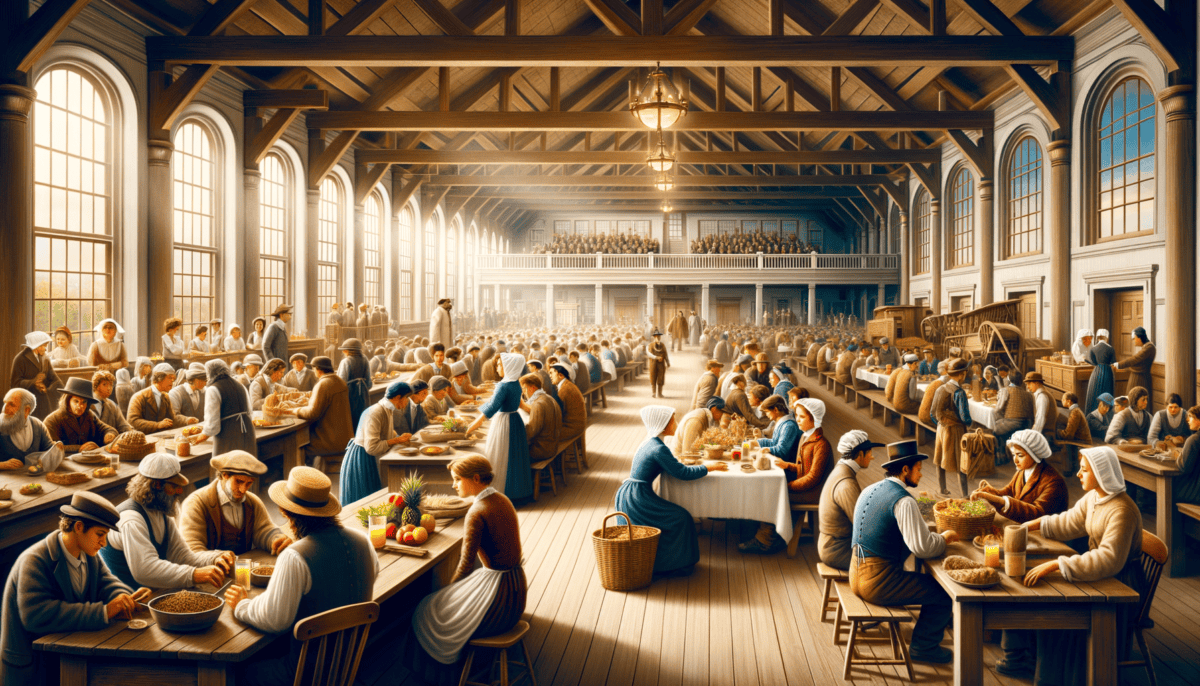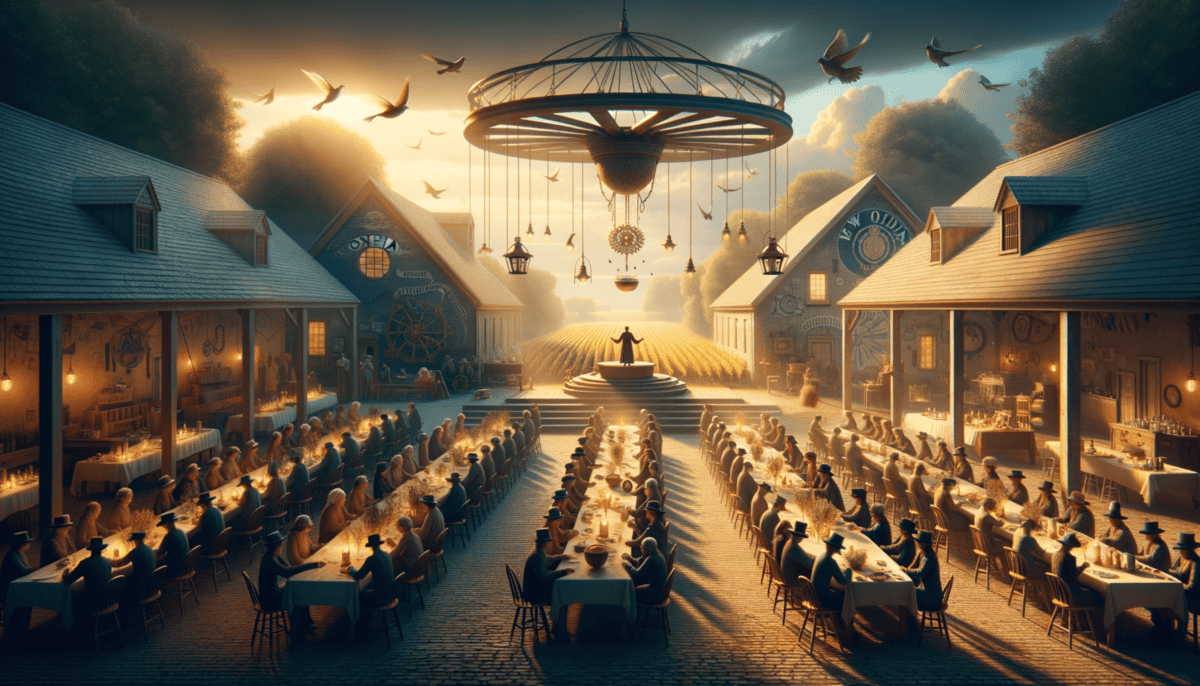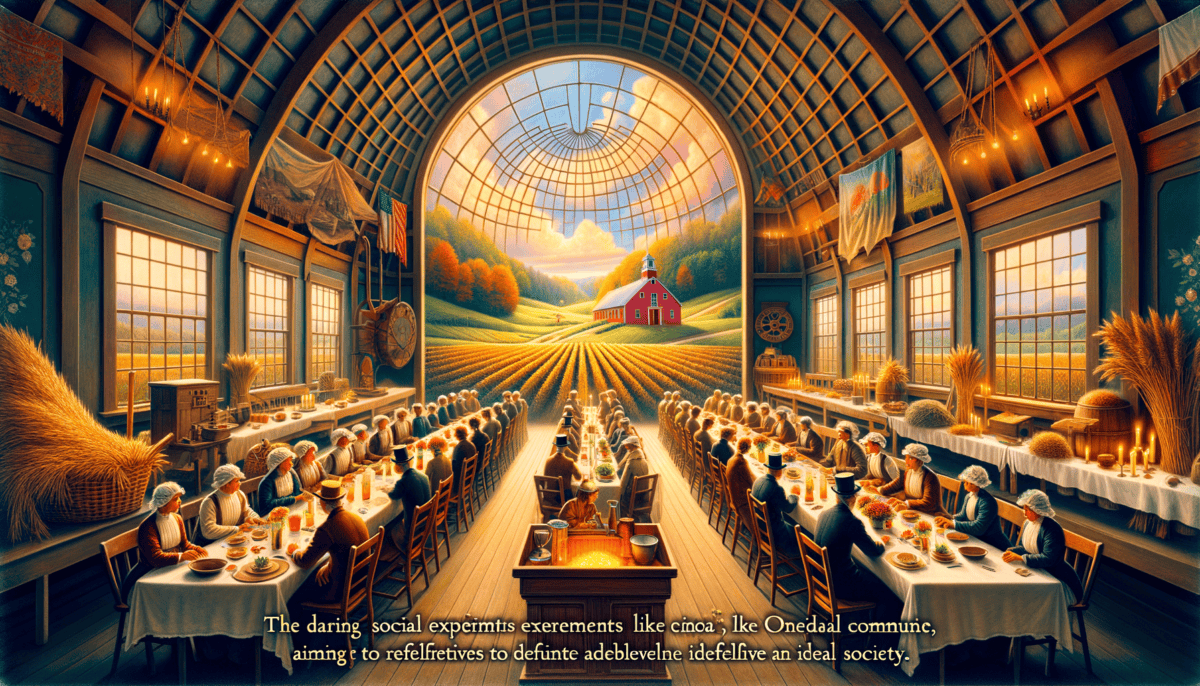A Dream of Perfect Living
Little Sarah peered out the window of her family's cramped New York City apartment in 1825. The streets below were dirty and crowded. "Papa, why can't we live somewhere nice and clean?" she asked her father.
Her father, John Humphrey Noyes, looked up from his Bible with a twinkle in his eye. "My dear, that's exactly what I've been thinking about. What if we could build a perfect place where everyone helps each other?"
This was how one of America's most amazing stories began – with a dream of making life better.
In those days, life was hard for most people. Cities were dirty. Many people were poor. But two special men had big ideas about fixing these problems:
The Two Dreamers
John Humphrey Noyes was a religious man from Vermont who believed people could live without being selfish. He wanted to create a place where everyone shared everything – like one big family!
Robert Owen came all the way from Scotland. He owned factories there and treated his workers very well. He thought: "What if we made a whole town where everyone is equal?"
A Time for New Ideas
America in the 1800s was changing fast. Trains were new. Cities were growing bigger. Some people thought: "This is our chance to start fresh!"
Sarah watched her father draw pictures of his dream community. "Will we have gardens?" she asked.
"Oh yes," smiled Noyes. "And workshops where everyone works together. Schools where children learn exciting things. Houses where people share meals like a family."
The First Steps
Both men faced big challenges. Some people laughed at their ideas. Others said it would never work. But they didn't give up!
Robert Owen spent lots of money buying land in Indiana. He called his community "New Harmony."
Noyes started smaller, gathering friends and family who believed in his ideas. They would later build "Oneida" in New York.
• Everyone would share everything
• All work would be split fairly
• Children would be raised by the whole community
• No one would be rich or poor
Big Dreams, Big Challenges
"But Papa," Sarah asked one evening, "what if people don't want to share?"
Noyes patted her head. "That's the hard part, dear one. We have to teach people that sharing makes everyone happier."
Meanwhile, in Indiana, Robert Owen stood on a hill overlooking his land. "Here," he said to his followers, "we will build something new."
The sun was setting, painting the sky orange and pink. Tomorrow would bring new challenges. But for now, both men held tight to their dreams of making the world better.
A New Beginning
As winter turned to spring in 1825, more people joined these brave dreamers. They came from cities and farms, rich and poor, all hoping to find something better.
They carried tools and books, seeds and hope. Some brought musical instruments to play in the evenings. Others brought skills to share – carpentry, farming, teaching.
"Look!" Sarah pointed at new faces arriving. "Our family is growing!"
Indeed it was. And with each new arrival, the dream of a perfect community grew stronger. But would these dreams come true? That was the question everyone asked as they worked to build their new homes under the wide American sky.
Building New Harmony
The spring sun warmed Robert Owen’s face as he walked through the land he had bought in Indiana. “This is where we’ll make dreams come true,” he told his son Robert Dale.
It was 1825, and Owen had big plans. He had paid $150,000 for a whole town! That was a lot of money back then.
A Special Place
The town already had neat brick buildings and gardens. It used to belong to a group called the Harmonists. Now Owen wanted to make it even better.
• 20,000 acres of land
• 180 buildings
• Almost 1,000 people
• 4 big farms
“Father,” young Robert Dale asked, “who will come live here?”
“Everyone!” Owen smiled. “Scientists, teachers, farmers, craftspeople. Anyone who wants to help build a better world.”
The People Arrive
Soon, wagons started rolling into New Harmony. People came from all over America and Europe. Each brought special skills:
Maria was a teacher who wanted to start new kinds of schools. “Children learn better when they’re happy,” she said.
Thomas was a farmer who knew how to grow lots of food. “We’ll have enough for everyone,” he promised.
Sarah was a weaver who could make beautiful cloth. “In New Harmony, everyone will have warm clothes,” she smiled.
Living Together
Life in New Harmony was different from other towns. Everyone ate together in big dining rooms. Children went to school together. Adults worked together in the fields and workshops.
“Here, we share everything,” Owen told the people. “Your success is my success. Your happiness is my happiness.”
New Ideas for Schools
Owen’s schools were special. Boys and girls learned together – that was new! They learned by doing things, not just reading books.
“Look!” shouted Jimmy, a young student. “I made a real wooden box!”
“And I learned about butterflies by catching them!” added his friend Emma.
Hard Times
But living in New Harmony wasn’t always easy. Some people didn’t like sharing everything. Others didn’t want to work hard.
“Why should I clean the dining room when Tom doesn’t help?” complained one woman.
“I miss having my own garden,” sighed another.
Owen tried to fix these problems. He made new rules. He talked to people about working together. But some people still weren’t happy.
Working Together
Still, many wonderful things happened in New Harmony:
✨ Scientists studied nature and made discoveries
✨ Musicians played concerts for everyone
✨ Children learned new ways to learn
✨ People from different places became friends
One evening, Owen watched children playing together in the town square. They were sharing toys and laughing.
“Maybe,” he thought, “this is what success looks like. Not everything is perfect, but people are learning to be kind to each other.”
As the sun set over New Harmony, Owen knew that even if his perfect community didn’t last forever, the ideas would live on. People would remember that they tried to build something special here.
Seeds of Change
Robert Dale patted his father’s shoulder. “What matters most, Father?”
“That we tried,” Owen answered. “We showed people that there might be a different way to live. Sometimes planting the seed of an idea is just as important as growing the whole garden.”
Life in Oneida
John Humphrey Noyes stood on a hill in New York state. The year was 1848. “This is where we’ll build our perfect community,” he said to his friends.
A Different Kind of Family
“In Oneida, we will all be one big family,” Noyes told the first group of people. They had bright eyes and happy faces. They wanted to try something new.
• Everyone shared everything
• All adults took care of all children
• Everyone worked together
• They made their own rules
Working Together
Little Sarah watched the grown-ups working in the big garden. “Why do you all work together?” she asked.
Mary smiled as she picked peas. “Because it’s more fun that way! And we get more done when we help each other.”
“When everyone works together, no one has to work too hard,” Noyes often said. “And there’s time left for fun!”
Making Things
The people of Oneida were very good at making things:
They made strong metal traps
They made silk thread
They grew fruit and vegetables
They made furniture
Learning and Playing
Children in Oneida had lots of fun. They played games and learned new things every day.
“Today we learned about plants!” Tommy said excitedly. “And tomorrow we’re going to build a birdhouse!”
The grown-ups took turns teaching the children. Everyone had something special to share.
Special Clothes
The women in Oneida wore different clothes than other people. They had short hair and pants like the men!
“Why do you dress like that?” asked a visitor.
“Because it’s easier to work in,” explained Emma. “And we think women should be comfortable!”
Happy Times
Every evening, everyone got together in the big house. They sang songs and told stories. Sometimes they put on plays.
“This is my favorite part of the day,” said little Michael. “It feels like one big party!”
Hard Choices
But living in Oneida wasn’t always easy. Some people didn’t like sharing everything. Others missed their old ways of living.
“Sometimes I wish I had my own room,” whispered Jane to her friend.
“And sometimes I miss my old toys,” her friend whispered back.
Growing Strong
Even with these problems, Oneida grew stronger. They made money from their factories. Their gardens gave lots of food. People came from far away to see how they lived.
One night, Noyes looked at his community from his window. Children were playing in the yard. Grown-ups were talking and laughing together.
“We’re doing something important here,” he thought. “We’re showing that people can live differently if they try.”
The stars twinkled over Oneida. Tomorrow would bring new challenges. But tonight, in this special place, people were learning to live as one big family.
A Day in Utopia
The sun rose over the shared gardens of New Harmony and Oneida. Let’s peek into what life was like in these special places!
Morning Time
Little Tommy woke up to the sound of a big bell. “Time to start our day!” called Mrs. Brown, the morning helper.
In these communities, mornings were different from regular towns. Everyone ate breakfast together in a big dining room.
“The best part about breakfast is sitting with different friends every day!” said Emma, a young girl at New Harmony.
Learning Together
School was special in these communities. Kids didn’t just sit at desks – they learned by doing things!
• Growing gardens
• Making crafts
• Taking care of animals
• Helping in the kitchen
Work and Play
“Can I help plant the carrots?” asked Billy, jumping up and down with excitement.
“Of course!” smiled Mr. Wilson. “Everyone helps here, even the little ones.”
Growing food
Washing clothes
Cleaning spaces
Tending gardens
Special Meals
Lunch and dinner were happy times. Everyone sat together at long tables.
“Pass the potatoes, please!” called voices around the room. Food came from their own gardens, and everyone helped cook it.
Fun After Work
When work was done, people had fun together:
“Let’s put on a play!” suggested Sarah.
“I want to sing songs!” said James.
“Can we tell stories?” asked Lucy.
Taking Care of Each Other
If someone got sick, everyone helped take care of them. If someone was sad, they got extra hugs and attention.
“When Billy hurt his knee, ten people came to help!” laughed his mother. “That’s what living together means.” ❤️
Bedtime Stories
At night, older kids read to younger ones. They shared rooms and told each other secrets.
“I like having lots of brothers and sisters,” whispered Mary as she fell asleep.
Growing Up Different
Children in these communities grew up feeling special. They knew how to work together and share.
“My cousin visited from the city,” said Johnny. “She didn’t know how to share her toys! I showed her how we do it here.”
Big Families
Everyone was like family, even if they weren’t related. Old people told stories to young ones. Teenagers helped little kids learn new things.
“Who’s your best friend?” a visitor asked Tommy.
“Everyone!” he answered with a big smile.
Storm Clouds Gather
Not everything stayed happy in the special communities. Like dark clouds before rain, problems started to grow. ️
Outside Troubles
“Look at those strange people!” whispered folks from nearby towns. They didn’t understand the different way of life in Oneida and New Harmony.
“Why can’t they leave us alone?” sighed Sarah, watching people point and stare at their community.
Money Worries
The communities needed money to buy things they couldn’t make. Sometimes, there wasn’t enough.
• Not enough food stored for winter
• Buildings needed fixing
• Tools were getting old
• Some people stopped working hard
Fighting Friends
“I want to do it my way!” shouted Tommy.
“But we always do it together!” cried Emma.
Living so close made some people cranky. Even good friends started fighting sometimes.
Tired Leaders
Mr. Noyes at Oneida and Mr. Owen at New Harmony got very tired. Leading everyone was hard work.
“My head hurts from solving so many problems,” Mr. Owen told his helper one day.
People Leaving
Some families started packing their bags. “We want to try living in regular towns again,” they said.
Little Lucy cried when her best friend moved away. “Will everyone leave?” she asked her mom.
Weather and Work
Bad weather made farming hard. Not enough food grew in the gardens.
“We used to have big feasts,” remembered Billy. “Now we have to be careful with our food.”
Different Ideas
People started arguing about how to fix problems:
“We should work longer!” said some.
“We should change our rules!” said others.
“Maybe we should be more like regular towns,” whispered a few.
Feeling Scared
The children could feel something was wrong. The grown-ups looked worried all the time.
“Why don’t we sing together anymore?” asked Mary one night.
Trying to Help
Some people worked extra hard to save their special homes:
“We can fix this!” said James, starting a new garden.
“Let’s work together like before,” suggested Mrs. Brown.
Dreams Take New Shape
The sun rose one last time over Oneida and New Harmony as they were. Big changes were coming.
A New Beginning
“Things must change,” Mr. Noyes told everyone at Oneida. “But we can keep the good parts of what we built.”
The big family-like community became a business instead. They started making silver spoons and forks that people still use today! ✨
“We may not live together anymore, but we’ll always be friends,” Sarah said, hugging her neighbors goodbye.
New Harmony’s New Way
In Indiana, New Harmony changed too. The big community broke into smaller groups.
• Good schools
• Love of learning
• Kind neighbors
• Beautiful gardens
• People helping each other
Happy Memories
Little Lucy smiled as she packed her toys. “Remember when we all played together in the big yard?”
“Those were wonderful times,” her mom said. “And we’ll make new wonderful times too.”
Lessons Learned
The communities taught people important things:
“Working together makes big dreams possible,” said Tommy.
“Being kind to others makes everyone happier,” added Emma.
New Adventures
Some families moved to cities. Others started farms nearby. Everyone took special memories with them.
“I’ll never forget our singing parties,” Mary said, waving to her old friends.
Good Things That Lasted
The communities may have changed, but they left good things behind:
Schools got better because of New Harmony’s ideas about teaching.
Oneida’s silverware company grew big and strong.
People learned that trying new ways to live could be good.
Dreams Live On
“Look what we built together,” said old Mr. Owen, smiling at the town New Harmony became.
Today, people still visit these special places. They learn about brave people who tried to make a perfect world.
The Story Continues
James looked at his children playing in the garden. “Maybe we didn’t make a perfect world,” he said. “But we made it better.”
“And that’s what really matters,” Mrs. Brown agreed, watching new families move into the old buildings.
The sun set on the old communities, but their spirit of working together and helping others lives on. Sometimes the best dreams don’t end – they just change shape and grow in new ways. ⭐


